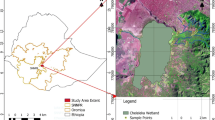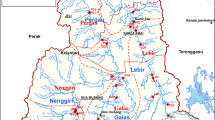Abstract
The health of surface water systems is a product of the cumulative contributing variables that interact with the surface water. Water quality monitoring programmes, which evaluate surface water systems, are crucial in regulating and maintaining the health of water bodies. This study characterised 19 surface water samples from streams and rivers traversing some urban metropolitan areas within Cape Town, South Africa. Standard procedures were used to assess the physicochemical properties and show temporal and spatial water quality variations. Seasonal mean concentrations of pH (6.79–8.36), temperature (14.3–27.6 °C), nitrates (0.55–20.0 mg/L) and phosphates (0.25–3.37 mg/L) were within set local and international standards for freshwater. Other parameters such as the total dissolved solids, TDS (3.72 × 10–6–1080 mg/L), turbidity (0.11–452.7 NTU), dissolved oxygen, DO (1.07–14.89 mg/L), and biochemical oxygen demand, BOD (1.07–15.64 mg/L) recorded various degrees of deviations. The National Sanitation Foundation Water Quality Index (NSFWQI) temporal water quality indices were better during winter season than for autumn and spring. Statistical interrogation showed that TDS, temperature, phosphate, and turbidity contributed to poor water quality. Anthropogenic factors such as inflow of effluent from treatment plants, golf course run-offs and indiscriminate dumping of refuse by informal local settlers were possible reasons for the spatial variability of the overall water quality. Thus, there is a need to mitigate pollution from the discharge sources, as they may threaten humans and other life forms that depend on the water resources for livelihood and recreational use.
Graphical abstract








Similar content being viewed by others
References
Adhikari, M. (2005). Contending approaches to coloured identity and the history of the coloured people of South Africa. History Compass, 3(1), 1–16. https://doi.org/10.1111/j.1478-0542.2005.00177.x
APHA. (1998). Standard methods for the examination of water and wastewater (20th ed.). American Public Health Association.
Chaturvedi, M., & Bassin, J. (2010). Assessing the water quality index of water treatment plant and bore wells, in Delhi, India. Environmental Monitoring and Assessment, 163(1–4), 449–453. https://doi.org/10.1007/s10661-009-0848-2
Chigor, V. N., Sibanda, T., & Okoh, A. I. (2013). Variations in the physicochemical characteristics of the Buffalo River in the Eastern Cape Province of South Africa. Environmental Monitoring and Assessment, 185(10), 8733–8747. https://doi.org/10.1007/s10661-013-3208-1
CoCT, City of Cape Town (2021). R3.2bn Athlone Wastewater Treatment Works Upgrade Under Way. City of Cape Town, Media Office. https://www.capetown.gov.za/Media-andnews/R3,2bn%20Athlone%20Wastewater%20Treatment%20Works%20upgrade%20under%20way. Accessed 13 Apr 2022
De Oliveira, M. D., De Rezende, O. L. T., De Fonseca, J. F. R., & Libânio, M. (2019). Evaluating the surface Water quality index fuzzy and its influence on water treatment. Journal of Water Process Engineering, 32, 100890–100899. https://doi.org/10.1016/j.jwpe.2019.100890
Debels, P., Figueroa, R., Urrutia, R., Barra, R., & Niell, X. (2005). Evaluation of water quality in the Chillán River (Central Chile) using physicochemical parameters and a modified water quality index. Environmental Monitoring and Assessment, 110(1), 301–322. https://doi.org/10.1007/s10661-005-8064-1
DWAF. (1995). South African Water Quality Guidelines- Procedures to Assess Effluent Discharge Impacts. Water Research Commission Report No: TT 64/94 (1st ed.). Department of Water Affairs and Forestry.
DWAF. (1996). South African water quality guidelines-domestic water use (2nd ed.). Department of Water Affairs and Forestry.
Effendi, H., & Wardiatno, Y. (2015). Water quality status of Ciambulawung River, Banten Province, based on pollution index and NSF-WQI. Procedia Environmental Sciences, 24, 228–237. https://doi.org/10.1016/j.proenv.2015.03.030
Goher, M. E., Hassan, A. M., Abdel-Moniem, I. A., Fahmy, A. H., & El-Sayed, S. M. (2014). Evaluation of surface water quality and heavy metal indices of Ismailia Canal, Nile River, Egypt. The Egyptian Journal of Aquatic Research, 40(3), 225–233. https://doi.org/10.1016/j.ejar.2014.09.001
Jindal, R., & Sharma, C. (2011). Studies on water quality of Sutlej River around Ludhiana with reference to physicochemical parameters. Environmental Monitoring and Assessment, 174(1), 417–425. https://doi.org/10.1007/s10661-010-1466-8
Jonnalagadda, S., & Mhere, G. (2001). Water quality of the Odzi River in the eastern highlands of Zimbabwe. Water Research, 35(10), 2371–2376. https://doi.org/10.1016/S0043-1354(00)00533-9
Jordaan, K., & Bezuidenhout, C. C. (2013). The impact of physico-chemical water quality parameters on bacterial diversity in the Vaal River, South Africa. Water SA, 39(3), 385–396. https://doi.org/10.4314/wsa.v39i3.7
Madilonga, R. T., Edokpayi, J. N., Volenzo, E. T., Durowoju, O. S., & Odiyo, J. O. (2021). Water quality assessment and evaluation of human health risk in Mutangwi River, Limpopo Province, South Africa. International Journal of Environmental Research and Public Health, 18(13), 6765–6780. https://doi.org/10.3390/ijerph18136765
Massoud, M. A. (2012). Assessment of water quality along a recreational section of the Damour River in Lebanon using the water quality index. Environmental Monitoring and Assessment, 184(7), 4151–4160. https://doi.org/10.1007/s10661-011-2251-z
McLean, S. (2022). South Africa’s Top 100 Courses-King David Mowbray, Cape Town, Western Cape. Southern Turf Management. https://satop100courses.com/course/king-david-mowbray/#:~:text=Mowbray%20is%20one%20of%20Cape,course%20near%20Cape%20Town%20Airport. Accessed 13 Apr 2022
Odjadjare, E. E., & Okoh, A. I. (2010). Physicochemical quality of an urban municipal wastewater effluent and its impact on the receiving environment. Environmental Monitoring and Assessment, 170(1), 383–394. https://doi.org/10.1007/s10661-009-1240-y
Olaniran, A. O., Naicker, K., & Pillay, B. (2014). Assessment of physico-chemical qualities and heavy metal concentrations of Umgeni and Umdloti Rivers in Durban, South Africa. Environmental Monitoring and Assessment, 186(4), 2629–2639. https://doi.org/10.1007/s10661-013-3566-8
Pharoah, R. (2012). Fire risk in informal settlements in Cape Town, South Africa. In M. Pelling & B. Wisner (Eds.), Disaster RISK REDUCTION: cases from urban Africa. Taylor & Francis.
Philander, F. R. (2015). An appraisal of urban agriculture as a livelihood strategy for household food security: a case study of urban food gardens in ward 51, Langa, Cape Town. Doctoral Thesis, University of the Western Cape, South Africa. http://etd.uwc.ac.za/xmlui/handle/11394/4719. Accessed 1 Apr 2022
RHP, Rivers Health Report. (2005). State of Rivers Report: Greater Cape Town’s Rivers. Pretoria: Department of Water Affairs and Forestry
Robins, S. (2019). ‘Day Zero’, hydraulic citizenship and the defence of the commons in Cape Town: A case study of the politics of water and its infrastructures (2017–2018). Journal of Southern African Studies, 45(1), 5–29. https://doi.org/10.1080/03057070.2019.1552424
Sharma, P., Meher, P. K., Kumar, A., Gautam, Y. P., & Mishra, K. P. (2014). Changes in water quality index of Ganges river at different locations in Allahabad. Sustainability of Water Quality and Ecology, 3, 67–76. https://doi.org/10.1016/j.swaqe.2014.10.002
Shrestha, S., & Kazama, F. (2007). Assessment of surface water quality using multivariate statistical techniques: A case study of the Fuji river basin, Japan. Environmental Modelling and Software, 22(4), 464–475. https://doi.org/10.1016/j.envsoft.2006.02.001
Takwi, C. N. (2017). An assessment of the management of odour at the Athlone wastewater treatment works, Cape Town. Masters in Technology Thesis (MTech), Cape Peninsula University of Technology, South Africa. http://etd.cput.ac.za/handle/20.500.11838/2788. Accessed 1 Apr 2022
UcunOzel, H., Ozel, H. B., Cetin, M., Sevik, H., Gemici, B. T., & Varol, T. (2019). Base alteration of some heavy metal concentrations on local and seasonal in Bartin River. Environmental Monitoring and Assessment, 191(9), 1–15. https://doi.org/10.1007/s10661-019-7753-0
USEPA. (1993). Methods for the Determination of Inorganic Substances in Environmental Samples. Report No: EPA/600/R-93/100. Office of Research and Development. Ohio, USA: United States Environmental Protection Agency.
USEPA. (2004). National Recommended Water Quality Criteria. Office of Water/Office of Science and Technology. United States Environmental Protection Agency.
WHO. (1996). Guidelines for drinking-water quality-health criteria and other supporting information (2nd ed.). World Health Organisation.
Acknowledgements
The authors wish to thank Mr Sosthene Kamanda, Mr Kudzanai Nyamayaro, Ms Daniela Kucich and Ms Judith Baruani for their assistance with the study. The authors also acknowledge Dr. Sinkala Musalula of the University of Cape, South Africa, for assisting with the statistical analysis.
Author information
Authors and Affiliations
Contributions
The authors contributed equally to the preparation of this manuscript.
Corresponding author
Ethics declarations
Conflict of interest
The authors declare that they have no competing interests.
Ethical approval
This article does not contain any studies with human participants or animals performed by any of the authors.
Rights and permissions
Springer Nature or its licensor holds exclusive rights to this article under a publishing agreement with the author(s) or other rightsholder(s); author self-archiving of the accepted manuscript version of this article is solely governed by the terms of such publishing agreement and applicable law.
About this article
Cite this article
Oputu, O.U., Akharame, M.O. Assessment of surface water quality within Cape Town, South Africa using NSF water quality index. Int J Energ Water Res (2022). https://doi.org/10.1007/s42108-022-00210-3
Received:
Accepted:
Published:
DOI: https://doi.org/10.1007/s42108-022-00210-3




